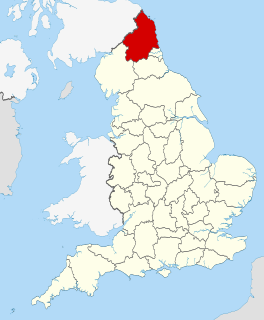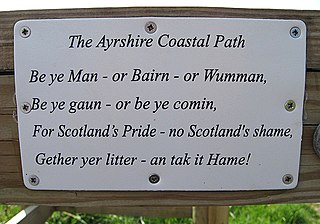It has been requested that the title of this article be changed to Northumbrian dialect . Please see the relevant discussion on the discussion page. The page should not be moved unless the discussion is closed; summarizing the consensus achieved in support of the move. |
This article needs additional citations for verification .(April 2009) (Learn how and when to remove this template message) |
| Northumbrian | |
|---|---|
| Native to | England |
| Region | Northumberland and County Durham |
| Language codes | |
| ISO 639-3 | – |
| Glottolog | None |

The Northumbrian dialect refers to any of several English language varieties spoken in the English county of Northumberland, the northern section of historic Northumbria (Bernicia) or present-day North East England. This may include such varieties as:

Northumberland is a county in North East England. The northernmost county of England, it borders Cumbria to the west, County Durham and Tyne and Wear to the south and the Scottish Borders to the north. To the east is the North Sea coastline with a 64 miles (103 km) path. The county town is Alnwick, although the County council is based in Morpeth.
Bernicia was an Anglo-Saxon kingdom established by Anglian settlers of the 6th century in what is now southeastern Scotland and North East England.

North East England is one of nine official regions of England at the first level of NUTS for statistical purposes. It covers Northumberland, County Durham, Tyne and Wear, and the area of the former county of Cleveland in North Yorkshire. The region is home to three large conurbations: Teesside, Wearside, and Tyneside, the last of which is the largest of the three and the eighth most populous conurbation in the United Kingdom. There are three cities in the region: Newcastle upon Tyne, the largest, with a population of just under 280,000; Sunderland, also in the metropolitan county of Tyne and Wear; and Durham. Other large towns include Darlington, Gateshead, Hartlepool, Middlesbrough, South Shields, Stockton-on-Tees and Washington.
Contents
- Phonology
- Consonants
- Vowels
- Subdialectal differences
- Comparison with Scots language
- Grammar
- Vocabulary
- Northumbrian Language Society
- References
- Further reading
- External links
- Northumbrian Old English, an Old English dialect from which Modern Scots is descended
- Geordie, perhaps the most famous dialect of English spoken in the region, largely spoken in Tyneside, centered on Newcastle [1] [2]
- Mackem, an dialect of English spoken in Wearside, centred on Sunderland
- Pitmatic, a dialect of English used in mining towns in Northumberland and Durham
- Northumbrian dialect, a disappearing English dialect or Anglic language variety spoken in the counties of Northumberland and Durham, [1] linguistically closest to Lowland Scots [3]
Northumbrian was a dialect of Old English spoken in the Anglian Kingdom of Northumbria. Together with Mercian, Kentish and West Saxon, it forms one of the sub-categories of Old English devised and employed by modern scholars.
Old English, or Anglo-Saxon, is the earliest historical form of the English language, spoken in England and southern and eastern Scotland in the early Middle Ages. It was brought to Great Britain by Anglo-Saxon settlers probably in the mid-5th century, and the first Old English literary works date from the mid-7th century. After the Norman conquest of 1066, English was replaced, for a time, as the language of the upper classes by Anglo-Norman, a relative of French. This is regarded as marking the end of the Old English era, as during this period the English language was heavily influenced by Anglo-Norman, developing into a phase known now as Middle English.

Scots is the Germanic language variety spoken in Lowland Scotland and parts of Ulster in Ireland. It is sometimes called Lowland Scots to distinguish it from Scottish Gaelic, the Celtic language which was historically restricted to most of the Highlands, the Hebrides and Galloway after the 16th century. The Scots language developed during the Middle English period as a distinct entity.
This article focuses only on the final variety, most commonly known in academic literature as Northumbrian dialect or Northumbrian English; however, the Northumbrian Language Society regards the dialect as divergent enough to be a separate language from English. [1]






